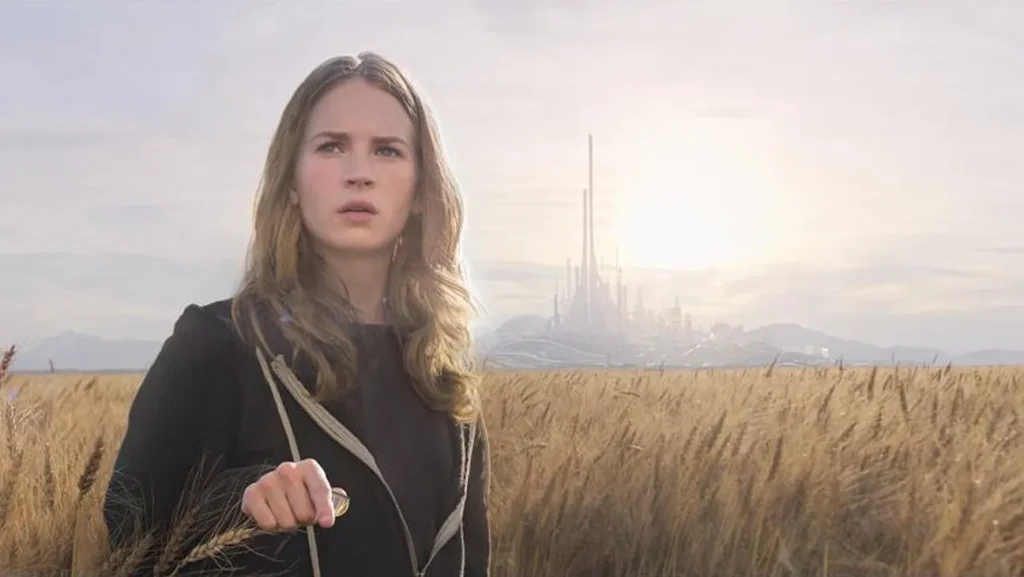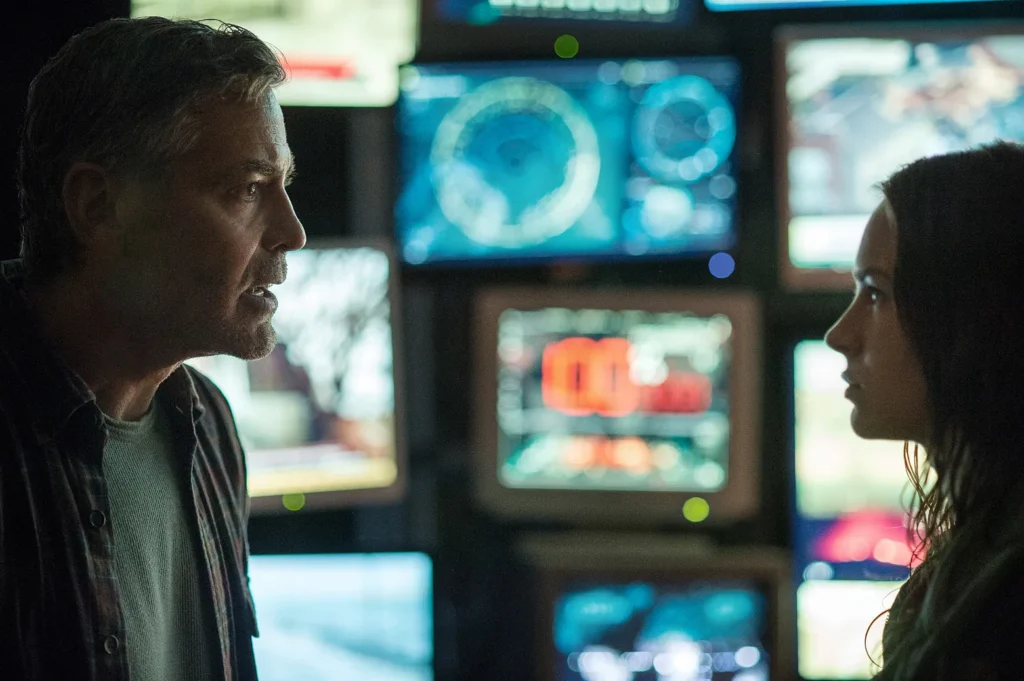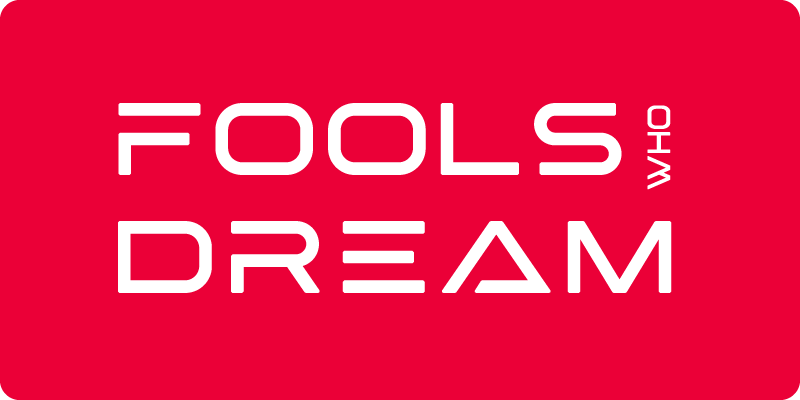It’s rare to see a Brad Bird film fail to catch cultural fire. His feature debut, “The Iron Giant” (1999), became a cult classic; he made bank with the “Incredibles” films (2004 and 2018) and “Ratatouille” (2007); and he reignited the “Mission: Impossible” series with “Ghost Protocol” (2011).
Bird honed his craft from his youth in Corvallis with a steady diet of Disney films (and even a fateful meeting with the Nine Old Men in Burbank in 1968). Yet when he based an entire film on a retro-futuristic Disneyland attraction, he endured an ironic defeat.
Disney released “Tomorrowland” on May 22, 2015—and Bird was stung by its failure to break even financially and attract the critical acclaim his other films had enjoyed.
“I didn’t want the studio to be rapped on the nose for doing something original,” he told Entertainment Weekly, “and then [be] given extra big treats and an air-conditioned suite for repeating old ideas.”
Despite Bird’s frustration, “Tomorrowland” has retroactively attained an aura of premonition. The film not only predicted Hollywood’s franchised-out future, but the ways in which social media has evolved during the last decade.
Set amid increasing social and environmental unrest, “Tomorrowland” envisions a time of dwindling hope. News reports fixate on disasters, NASA is set to demolish its Florida launch site, and we see billboards for the upcoming apocalyptic franchise movie “Toxicosmos 3.”
Struggling to conquer these societal ills are Casey (Britt Robertson), Athena (Raffey Cassidy), and Frank (George Clooney). It’s no mean feat: They take nearly two thirds of the movie to reach Tomorrowland, an elusive beacon of possibility hidden in a parallel dimension accessible via rocketship from the Eiffel Tower.
(This concept recalls Galt’s Gulch in Ayn Rand’s “Atlas Shrugged,” and some critics saw “The Incredibles” as an Objectivist parable. Bird disagrees, arguing that right-wing pundits disdained “The Iron Giant” as pro-communist, proving his ability to rile up opinions across the political spectrum.)
When the film’s heroes finally arrive at Tomorrowland, it is almost entirely abandoned, save for the quasi-immortal Nix (Hugh Laurie) and an army of automatons known as Audio Animatronics. And despite his extended life experience, Nix takes a dim view of humanity’s future.
“How do you think people responded to the prospect of imminent doom? They gobbled it up like a chocolate éclair,” Nix rages. “They didn’t fear their demise, they repackaged it. It can be enjoyed as video games, as TV shows, books, movies.”
The self-annihilation Nix fears is predicted by Tomorrowland’s centerpiece, a tachyon amplifier that Frank helped build as a child, using time-bending theoretical particles to detect a looming apocalypse.
Nix has used this machine to signal warnings to the people of Earth, but he concludes that the doom promised by the amplifier is a prophecy destined to be fulfilled, despite Casey’s irrepressible optimism (her not-so-secret superpower).
“What if you get all the way up there and there’s nothing?” Casey is asked in a home video as she looks to the stars. “What if there’s everything?” she counters.

As far as Nix is concerned, there’s nothing but nothing. His nihilism is chilling, and it foreshadows how social media would decay from being a tool of worldwide connection to a medium for endless doomscrolling, feeding humanity’s worst instincts.
Additionally, the Audio Animatronics whom Nix sends to Earth anticipated how the proliferation of AI tools and foreign trolls would degrade the quality of social media and search engines—while aggravating grievance-powered fandoms in the process.
Early in her quest, Casey visits a nerd-friendly antique shop (strewn with “Star Wars” paraphernalia), only to find that shopkeepers Ursula (Kathryn Hahn) and Hugo (Keegan-Michael Key) are Audio Animatronics, angry that she asks too many questions while dodging theirs.
(Later, when Casey reaches Frank, Audio Animatronic assassins swarm his house, all sinister smiles and creepy robot-speak: “John Francis Walker, you are harboring a fugitive element!”)
To its credit, the film doesn’t paint all Audio Animatronics as villainous. Athena, for one, is adept at passing for human (even if she doesn’t age) and genuinely kindhearted (Cassidy, who recently starred in “The Brutalist,” embodies the character with an eerie mixture of childlike sincerity and adult poise).
Athena is forever tied to Frank: She knew him as a boy, and they developed feelings for each other. Even after Frank was banished from Tomorrowland as a young man, Athena rejected her dispassionate father figure, Nix, a choice that leads directly to the film’s wrenching climax.
Ten years on, Athena’s heroic sacrifice—self-destructing to bring down the tachyon amplifier, saving Frank and the world—can still bring viewers to tears. Her death is heartbreaking, even as it rouses the hope of seeing Tomorrowland fulfill its potential.
When “Tomorrowland” flopped, Disney’s own potential dimmed as the studio focussed on remaking animated films to diminishing returns. Meanwhile, a third “Tron” film was reportedly canceled by 2018, though “Tron: Ares” is now slated to hit theaters on Oct. 10, 2025.
(Whether “Ares” succeeds is another story, since casting Jared Leto won’t do it any favors.)
By 2015, Disney had acquired Marvel and Lucasfilm, relying on branding rather than creation, to increasingly ill effect. Even Kevin Feige, the once indomitable president of Marvel Studios, has hit roadblocks, due in part to the pandemic and the WGA and SAG strikes.
For its part, Lucasfilm spent the latter half of the 2010s announcing “Star Wars” spinoffs from the likes of Taika Waititi and Rian Johnson, most of which wound up quietly canceled. It’s all a far cry from the promise of originality and innovation that enlivened “Tomorrowland.”
Still, Casey’s optimism shines through Nix’s (and Disney’s) darkness. The film ends with her and Frank inviting scientific and artistic geniuses to Tomorrowland, offering not isolation in a transdimensional bubble, but the incubation of their talents until they are ready to make their mark on the world.
As the best creators—Brad Bird included—are destined to.



